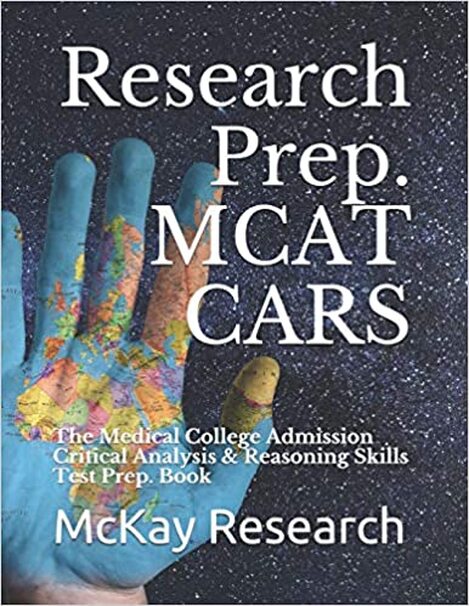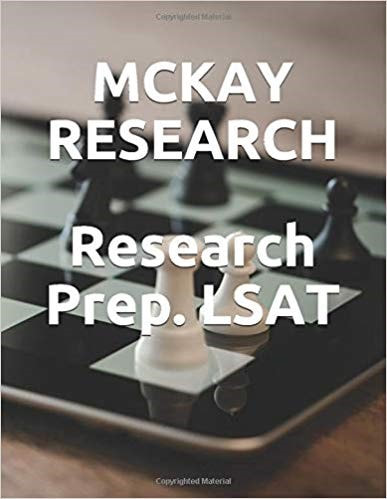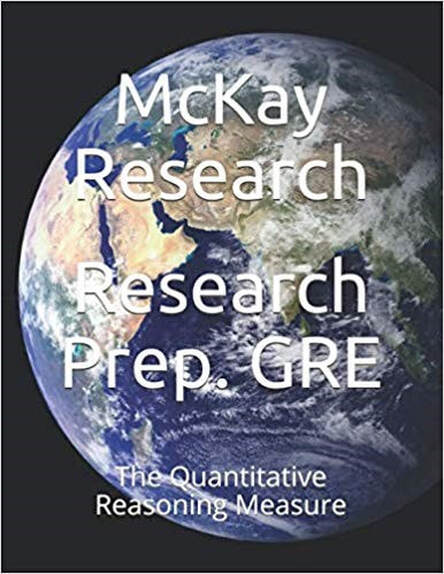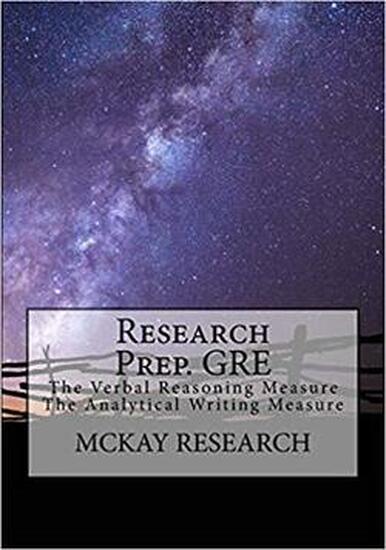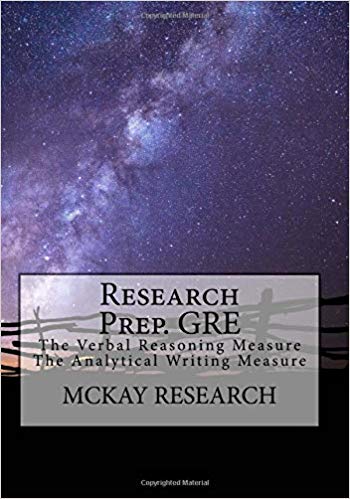
Research Prep. GRE Online Class
This online course will help you to succeed on the GRE!
It covers both the:
- Verbal Reasoning Measure (sentence equivalence questions, text completion questions, and reading comprehension questions); and
- Analytical Writing Measure (essay).
This is a course, rather than online content. That means that you will watch approximately twenty-course videos, each fifteen to fifty minutes long, and complete practice questions found in the downloadable book: Research Prep. GRE: The Verbal Reasoning Measure, The Analytical Writing Measure, by McKay Research. The course comes with the McKay Research downloadable, illustrated GRE textbook.
This class will discuss how to tackle the test as a whole, how to succeed on each type of question, and how to write excellent GRE essays. It is a verbal and essay course without the math section. This course is designed to approximate a weekend-long in-person course, which can be taken by you via the internet instead of attending the course in person. You will have access to the course for one month after you receive it. It takes about 12 to 24 hours to receive your login information after your purchase.
If you sign up for an in-person course, and cannot attend for any reason, you can exchange your in-person course spot for the online course. It is the same course content, taken via the internet. Just let us know the day before you miss your class.

Ten hours of one-on-one GRE tutoring (using zoom or google plus)
Personal tutoring will help you to succeed on the GRE!
In ten hours of one-on-one tutoring sessions, we will improve your scores on both the:
- Verbal Reasoning Measure (sentence equivalence questions, text completion questions, and reading comprehension questions); and
- Analytical Writing Measure (essay).
Tutoring sessions are sold in ten-hour blocks of time; we will work together in two or four-hour sessions based on a schedule we set together after the purchase is made. We will ensure that the schedule accommodates your needs. This is a course which proceeds according to your pace.
In this one-on-one course, we will discuss how to tackle the test as a whole, how to succeed on each type of question, and how to write excellent GRE essays. It is a verbal and essay course without the math section. This course is designed to accommodate your needs and flex according to your schedule. The course textbook is Research Prep. GRE: The Verbal Reasoning Measure, The Analytical Writing Measure, by McKay Research.
If you sign up for an in-person course, and cannot attend for any reason, you can exchange your in-person course spot for the online course. It is the same course content, taken via the internet. Just let us know the day before you miss your class.

Ten hours of one-on-one MCAT CARS tutoring online (using zoom or google plus)
Personal tutoring will help you to succeed on the MCAT Critical Analysis & Reasoning Skills Section!
In ten hours of one-on-one tutoring sessions, we will improve your scores on these difficult MCAT questions! The MCAT CARS section comprises one section of the MCAT, and it covers three skill sets:
- Foundations of Comprehension,
- Reasoning Within the Text, and
- Reasoning Beyond the Text.
Tutoring sessions are sold in ten-hour blocks of time; we will work together in two or four-hour sessions based on a schedule we set together after the purchase is made. We will ensure that the schedule accommodates your needs. This is a course which proceeds according to your pace.
In this one-on-one course, we will discuss how to tackle the test as a whole, how to succeed on MCAT CARS. It is a CARS course without the science sections. This course is designed to accommodate your needs and flex according to your schedule. The course textbook is Research Prep. MCAT: The Medical College Admission Critical Analysis & Reasoning Skills Test Prep. Book, by McKay Research
If you sign up for an in-person course, and cannot attend for any reason, you can exchange your in-person course spot for the online course. It is the same course content, taken via the internet. Just let us know the day before you miss your class.

Ten hours of one-on-one LSAT tutoring (using zoom or google plus)
Personal tutoring will help you to succeed on the LSAT!
In ten hours of one-on-one tutoring sessions, we will improve your scores on:
Logical Reasoning Questions
· Logical reasoning questions present test takers with a short passage of about one paragraph.
· Logical reasoning questions require test takers to consider the reasoning within the paragraph and choose the best answer from multiple possible answers.
· Test takers must critically examine, evaluate, analyze, or complete the argument made in the paragraph.
Analytical Reasoning Questions
· Analytical reasoning questions present a short passage to test takers that delineates a factual scenario.
· A rule or list of conditions is set forth beneath the passage. These rules or conditions must be adhered to by test takers as they work within the scenario to answer questions.
· Several questions relate to each passage and rule list (or list of conditions). The questions ask test-takers to determine ordering, grouping, and other various relationships that could exist within the scenario.
· In order to achieve a correct answer, the rule list and any new question-specific rules or instructions must be adhered to.
· The questions ask test-takers to perform deceptively simple tasks, such as arranging package deliveries in order, scheduling appointments in time slots, distributing spots for admission, and organizing seating arrangements around tables. However, the detailed rule list and question-specific requirements make these questions especially challenging.
Reading Comprehension Questions
· Reading comprehension questions present to test takers three lengthy reading passages and one set of comparative reading passages (these are two shorter passages that you consider together).
· Reading comprehension questions ask five to eight detailed questions about each passage (or set of comparative passages). The questions require you to demonstrate a detailed understanding of what you have read; test takers succeed when they can thoroughly comprehend the reading.
· Passage topics are varied; they most often include humanities, science, legal, and social science texts. However, other types of passages will sometimes be included by the test writers.
· The three lengthy passages generally reflect sophisticated writing and vocabulary and can contain unusual complexities in argument structure and viewpoint.
· The two shorter comparative reading passages require test takers to consider the relationship of one passage to the other; test-takers answer questions regarding points made in one and then juxtapose these to counterpoints made in the other. Test takers will also consider individual applications of principles and the principles themselves, as well as generalities and specific instances in relation to passage arguments and descriptions.
The Writing Sample
· The writing sample is the essay portion of the LSAT. While the writing sample is mandatory, it is not graded and is therefore not a part of your LSAT score. Law schools independently evaluate each applicant’s LSAT writing sample after receiving the potential law student’s application.
Tutoring sessions are sold in ten-hour blocks of time; we will work together in two or four-hour sessions based on a schedule we set together after the purchase is made. We will ensure that the schedule accommodates your needs. This is a course which proceeds according to your pace.
In this one-on-one course, we will discuss how to tackle the test as a whole, how to succeed on each type of question, and how to write an excellent writing sample. This course is designed to accommodate your needs and flex according to your schedule.
Your course textbook is:
Research Prep. LSAT: The Law School Admission Test Prep. Book,
By, McKay Research.
Purchase your textbook on Amazon.com or Barnes and Noble.com and bring it to class.
If you sign up for an in-person tutoring course, and cannot attend for any reason, you can reschedule your time. Just let us know a few days before you miss your session.
